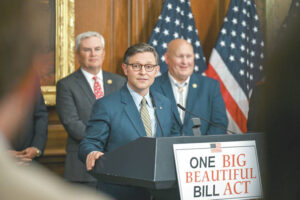North Dakota governor vetoes bill restricting library books
North Dakota Gov. Kelly Armstrong this week vetoed a bill that would have required most libraries in the state to keep material considered sexually explicit in areas difficult for minors to access. Under the measure, librarians who do not comply could have faced prosecution.
Armstrong, a Republican former member of Congress in his first year as governor, said in his veto message that the bill “represents a misguided attempt to legislate morality through overreach and censorship.”
ADVERTISING
“The bill imposes vague and punitive burdens on professionals,” Armstrong added in a letter dated Tuesday, “and opens the door to a host of unintended and damaging consequences for our communities.”
The Legislature could override the veto with a two-thirds vote in both the Senate and House, but the bill passed the House with a narrow 49-45 majority. Republicans hold large majorities in both chambers.
The legislation was part of a broader push by conservatives to restrict access to library books that they consider inappropriate for children, an effort that has alarmed many librarians and free speech advocates. New library laws or regulations have been approved in recent years in several Republican-led states, including Idaho, Iowa, South Carolina, Tennessee and Utah.
North Dakota Republicans have been split on the issue. In 2023, former Gov. Doug Burgum, a Republican, signed a measure that required explicit materials to be removed from the children’s sections of libraries. But Burgum, who is now the interior secretary, vetoed a bill that would have imposed criminal penalties on librarians found guilty of willfully exposing minors to sexually explicit materials.
The bill passed this year was somewhat less punitive than the one Burgum had vetoed, and it would have given librarians a 10-day period to move materials that a local prosecutor found to be obscene. Only if a librarian failed to comply during that period could they have faced criminal charges.
In legislative hearings, Republican supporters defended the bill as a way to protect children from inappropriate or harmful content. Some lawmakers cited examples of North Dakota libraries stocking materials with sexual themes and illustrations that they found offensive, and complained that librarians often failed to take parents’ complaints about books seriously.




